火曜日の朝(7日)、90歳で亡くなったジャン・バニエは、人生の大部分を死に寄り添うことに費やした。
[toggle]Jean Vanier, who died Tuesday morning at age 90, lived much of his life beside death. [/toggle]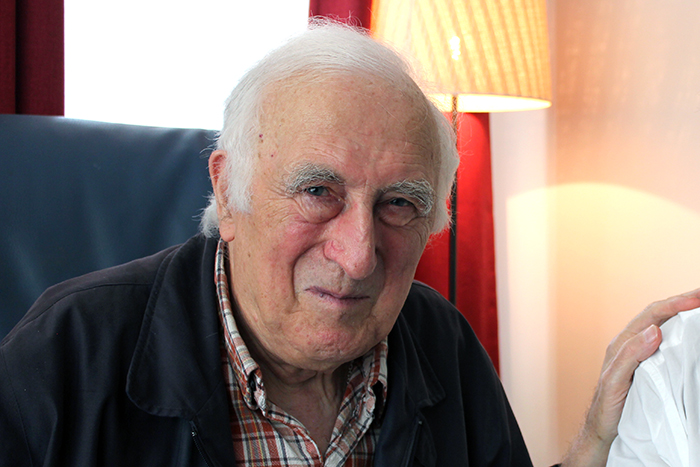
(写真:Kotukaran)
「過去42年間で、私たちは多くの死者を見送りました。そして、その死を祝ったのです。それが私たちのコミュニティーの根幹です」とバニエは書いている。フランスのトロリー・ブレイユにある「ラルシュ」コミュニティーは、知的障がいや発達障がいのある人もない人も共に、信仰と友情をもって暮らす最初の共同体で、ここからラルシュは国際ネットワークへと広がっていった。
[toggle] “Over the last forty-two years we’ve had many deaths, and we’ve spent a lot of time celebrating death. It’s very fundamental to our community,” he wrote, referencing his experience in L’Arche community of Trosly-Breuil, France—where Vanier began the first of an international network of communities for people with and without intellectual and developmental disabilities to live together in faith and friendship. [/toggle]『暴力の世界で柔和に生きる』(日本基督教団出版局)にはこう書かれている。「死を祝うことは、その人について話をすることです。たとえば、最近亡くなったジャニーンの話で言えば、私たちは彼女がどれほど美しい人だったか、どれほどのことを私たちにもたらしてくれたのかを集まって語り合いました。訪れてくれた彼女の姉妹と一緒に、私たちは泣きながら笑ったのです。彼女がいなくなったことで泣き、彼女がしてくれた多くの素晴らしいことについて笑いました」
[toggle]As he recounted in his book Living Gently in a Violent World, “To celebrate death is to gather around and talk about the person—about Janine, for example, who died recently. We gathered to say how beautiful she was, how much she had brought to us. Her sisters came, and we wept and laughed at the same time. We wept because she was gone, but we laughed because she did so many beautiful things.” [/toggle]それと同じように、ジャン・バニエに影響を受けた私たちはみな、大きな悲しみと感謝を抱いている。彼は私たちをより「人間らしく」させてくれ、多くの素晴らしいことを教えてくれた。
[toggle]Likewise, those of us who have been formed and inspired by Jean Vanier have hearts heavy with both grief and gratitude as we celebrate the beautiful things we learned from a leader who helped us all to become more human. [/toggle]特権と地位があるところに生まれ、高等な教育を受けた人が、イエスと同じようにへりくだる道を歩むことはあまりない。しかし、ラルシュ・インターナショナルの創設者、バニエは何十年もの間、知的障がいのある人とない人とのコミュニティーで暮らし、それに伴う喜びや複雑さ、そして課題を受け入れつつ過ごした。
[toggle]We don’t often find people born into privilege and status, and highly educated, who then follow the downward path of Jesus. But as founder of L’Arche International, Vanier spent decades in community with people with and without intellectual disabilities and embraced the joys, complications, and demands that go along with such a life. [/toggle]バニエは1928年、父親がカナダ総督(国家元首)という、名声と人望を持つ敬虔なカトリック家庭の5人きょうだいの4人目として生まれた。長い間、海軍で働いたのち、だんだんと地域社会の生活や霊的慣習に惹(ひ)かれていった。そして50年、30日間の「霊操」(イグナチオ・デ・ロヨラによって始められた霊的黙想)を行った後、職を辞した。
[toggle]The fourth of five children, Vanier was born into a deeply Catholic family with prestige and prominence in Canadian society. He served in the Navy for a number of years but was continually drawn to community life and spiritual practices. After a 30-day Ignatian prayer retreat, he resigned from the service. [/toggle]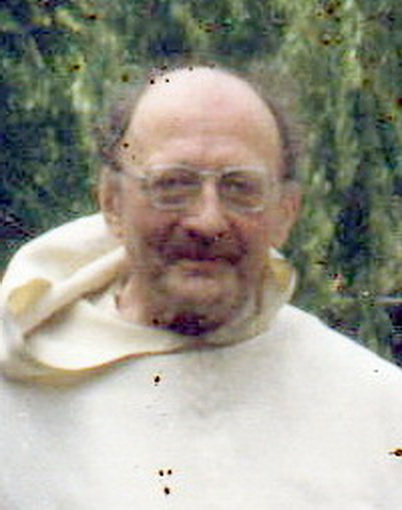
トーマス・フィリップ神父(写真: Titoumf)
彼の人生で特徴的なのは、「聴くことや共にいることがもたらす価値を認識する」ということだ。そんな彼の人生と信仰観を転換させたのがトーマス・フィリップ神父との新たな友情だったと聞けば、納得がいく。
[toggle]It makes sense that for a person whose life was marked by recognizing the impact of relationships of listening and presence, it would be a new friendship—Vanier’s connection with priest and mystic Father Thomas Phillippe—that would transform his life and ministry. [/toggle]パリ・カトリック大学で哲学博士号を取得し、カナダのトロント大学などで倫理学を教えた後、1964年、フランスのヴァル・フルーリにある小さな知的障がい者施設にいたフィリップ神父のもとを訪れた。施設には悪臭が漂い、食事も十分ではなかったが、バニエはそこにイエスの臨在を感じ、施設から数人の男性を連れ出して一緒に暮らすよう突き動かされた。
[toggle]After earning his doctorate in philosophy in Paris and teaching ethics in Canada, Vanier visited Father Phillippe in Val Fleuri, a small institution in France made up of men with intellectual disabilities. Though this was an institutional space marked by foul odors and a lack of human nurture, Vanier recognized that Jesus was there in a special way and eventually felt compelled to invite a few men out of the institution to live with him. [/toggle]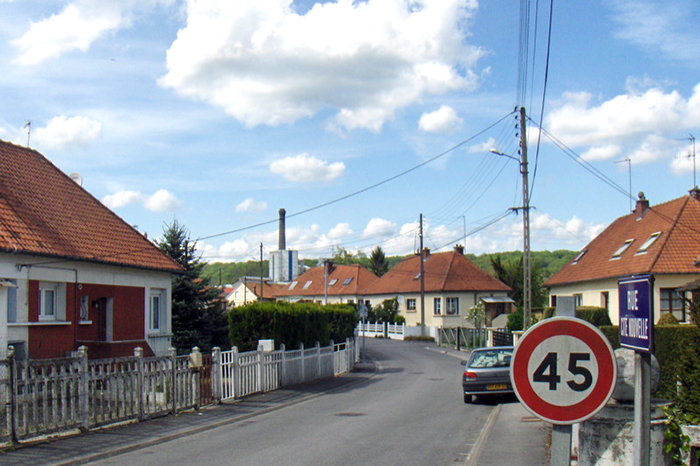
トロリー・ブレイユ(写真:Melaine)
1964年8月、そのうちの3人が、彼の住むフランスのトロリー・ブレイユの家に引っ越してきた。ダニーはすぐになじみのある元の環境に戻ったが、ラファエル・シミとフィリップ・スーは留まることに決めた。この小さな家で、フランス語で「箱舟」を意味する「ラルシュ」運動が始まったのだ。
[toggle]So in August 1964, three of them moved to his home in Trosly-Breuil, France. One, Dany, came and went quickly, desiring to return to a familiar environment. But two others, Raphael Simi and Philippe Seux, decided to stay. With this small household, the L’Arche movement—French for “The Ark”—began. [/toggle]カトリック神学者であった彼は、「ラルシュは一方的な奉仕の場ではない」と早い段階から理解していた。彼が重要視した「人間関係における真の相互性」は、世の教会に彼が残した最も普遍的な遺産の一つだ。コミュニティーにおいて私たちが真の関係性を築くことを可能にするのは、人間の弱さと傷つきやすさであることをバニエは知っていた。知的障がいのあるメンバーは、一貫して自分のニーズや喜び、愛、そして痛みを彼に惜しみなく伝えた。
[toggle]The Catholic theologian understood early on that L’Arche would not be a place of one-sided service, and his emphasis on true mutuality in relationships has become one of his most enduring legacies for the church. In community, Vanier discovered how human weakness and vulnerability enables us to forge real connections. His fellow community members with intellectual disabilities instructed him with their consistent openness with themselves: their needs, joys, loves, and pain. [/toggle]私たちに共通する人間性、すなわち、愛し、愛されたいという願い、そして私たちの賜物(たまもの)を育て、共有したいという願いを、バニエは強調するようになった。そして、弱い立場にある人々や、目に見えて苦悩や痛みを経験させられる人々がコミュニティーの中心にあることを意識した。彼ら、彼女らの傷つきやすさによって、全員が一つのところに呼ばれるのだ。時が経つにつれ、私たちはみな、自らの欠けた部分や弱さを見つけ、「彼ら」は「私たち」でもあると認識するようになる。
[toggle]Vanier came to emphasize our common humanity: the desire to love and be loved and to develop and share our gifts. He recognized that people who are vulnerable, who experience their anguish and pain openly, are at the core of communities. In their vulnerability, they call everyone together. Over time, we all come to discover our own brokenness and fragility, realizing that “they” are also “us.” [/toggle]知的障がい者に関わる働きの多くは、まず助けられる人と助ける人の間を明確に分ける。しかし、そのパラダイムは少しずつシフトしてゆき、ラルシュでのバニエのアプローチに近づいている。その中心にあるのは、キリストの体の一部として賜物を分かち合い、福音の働きを共にすることだ。私たちの間にある違いは、むしろ互いを必要としていることを教えてくれ、分断ではなく豊かさをもたらすものなのだ。
[toggle]While many ministries involving people with intellectual disabilities began with a clear separation between those being helped and those doing the helping, slowly the paradigm has shifted toward Vanier’s approach at L’Arche, where all are called to share their gifts as members of one body of Christ, doing the work of the gospel together. Our differences show us that we need each other; they can enrich us instead of dividing us. [/toggle]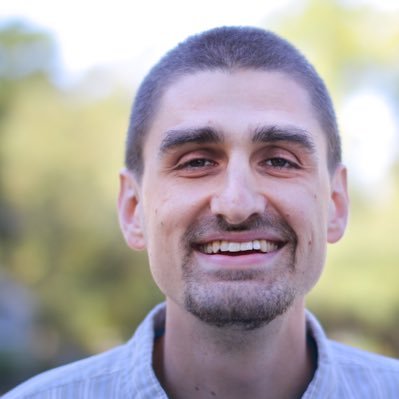
ジョナサン・ウィルソン・ハートグローブ(自身のツイッターから)
「信仰と障がい」の分野で働く人々が「それぞれの賜物」という概念を教会や社会的な働き、学会にもたらしたのは、バニエとラルシュの真摯(しんし)な神学によるところが大きい。彼の神学は垣根を越えて、キリスト教の文化や宗派にも影響を与えている。たとえば、シェーン・クレイボーンの「ザ・シンプル・ウェイ」や、ジョナサン・ウィルソン・ハートグローブの「ルトバハウス」のような目的共同体などだ。ウィルソン・ハートグローブは、バニエとラルシュの働きを永続的なインスピレーションの源とし、バニエの教えについてこう述べている。「貧しい人を助けたいという気持ちで人々はコミュニティーにやって来る。しかし、彼らは自らの貧しさを知って、そのコミュニティーに留まる」
[toggle]It is in large part due to the heartful theology of Vanier and L’Arche that those of us who work at intersections of faith and disability have brought this sense of mutual giftedness into churches, social ministries, and the academy. His theological influence extended across Christian traditions and denominations, including intentional communities like Shane Claiborne’s The Simple Way and Jonathan Wilson-Hartgrove’s Rutba House. Wilson-Hartgrove counts Vanier and the work of L’Arche as an enduring inspiration, referencing teachings from Vanier such as “People come to community because they want to help the poor. They stay in community because they realize they are the poor.” [/toggle]コミュニティーの中で違いを持つように見える人たちを一致へと、バニエのミニストリーは引き寄せた。また、そのメッセージは幅広い人たちの関心を引き、知的障がいのある人々だけでなく、学者や知識人の心も捉えた。バニエは力強い言葉で語り、またそれを自然に生活で実践することで、私たちの体と心の共生、「自分として一致すること」を伝えた。
[toggle]Just as Vanier’s ministry drew people who seemed different together in community, his message likewise had broad appeal, capturing the hearts and imaginations both of people with intellectual disabilities and of scholars and intellectuals. Vanier compellingly described and so naturally lived into the integration of our whole selves—including our bodies and our hearts. [/toggle]ラルシュに住んでいる私の友人をはじめ、バニエに引き寄せられる知的障がい者たちは、彼のことを感謝を込めて「優しくて親切な友だち」と呼ぶ。そして、ラルシュのようなコミュニティーで暮らすことを楽しんでいる。ラルシュは、人々が互いにありのままの姿を知り、愛し合うことを求めている場所だからだ。
[toggle]For people with intellectual disabilities who are drawn to Vanier, at least as my friends who live in L’Arche tell it, they appreciate him as a gentle and kind friend. They also enjoy living in a community like L’Arche, which strives to be a place where people seek to know and love each other as they are. [/toggle]コミュニティーとして、人間の物理的・精神的な側面を尊重することにより、困難に直面する時でも、この場所は(完全ではないにせよ)「愛を教える場所」となる。バニエが言うように、互いに口論していたイエスの弟子たちでさえ、一致するようにとの召命を受けたのだ。
[toggle]Being a community that honors the embodied and emotional aspects of being human is part of what makes this a place to live that—while imperfect—becomes a “school of love” even in its difficulty. As Vanier points out, even Jesus’ first disciples squabbled with each other, yet they were called to be together. [/toggle]学者や知識人、あるいは精神の合理性が気になってしょうがない人に対してバニエは、立ち止まって、自分の体や苦悩、心に寄り添うよう呼びかける。そして、他の人の体や苦悩、心にも。ラルシュでの生活は、神学を「考える」ことよりもコミュニティーで「実践する」ことに命題を持つ。
[toggle]For scholars and intellectuals, or really anyone who can be over-focused on the rational life of the mind, Vanier calls us to pause and find healing as we also attend to our bodies, our anguish, our hearts—and to the bodies, anguish, and hearts of others. Life in L’Arche is less about thinking theology and more about doing theology in community. [/toggle]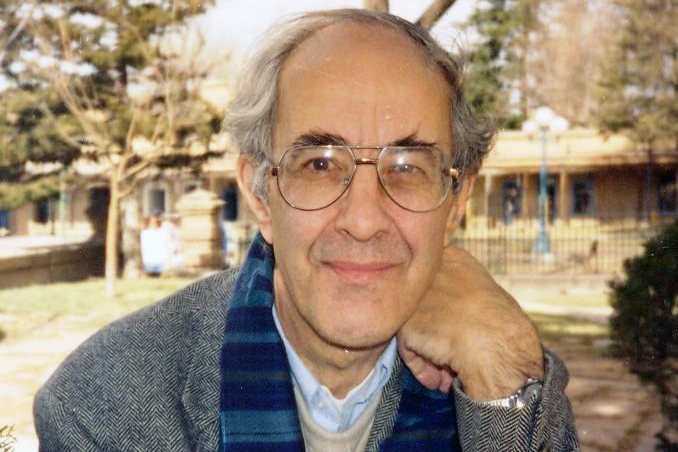
ヘンリ・ナウエン(写真:Frank Hamilton)
カトリックの司祭であり霊的教師であるヘンリ・ナウエンが言うように、「ラルシュは言葉ではなく体の上に成り立っており、小さな出来事を通して愛の霊性を得る場所」だ。ここで言う「小さな出来事」とは、泣いている誰かの手を握ったり、誰かが賜物を育てるためのすき間を作ったり、嫌なことをされた時に「腹が立ったけど赦(ゆる)す」、「自分も忍耐できるようにする」と言ったりすることだ。これらは共同体の崇高な理想やキリスト教的愛といった概念ではなく、現実の世界から生まれた、私たちの体と心に植えられるべきものだ。
[toggle]As Catholic priest and spiritual teacher Henri Nouwen pointed out, “L’Arche is built upon the body, not the word. Words are secondary.” It’s about “a spirituality of love through small things,” everyday actions like holding the hand of someone as they cry, making space for someone to exercise their gifts, saying “I forgive you for annoying me” and “I will also work on my own patience” when someone we live with is annoying us. These are not lofty, idealized notions of community or Christian love, they are grounded in reality and require the integration of our bodies and our hearts. [/toggle]ナウエンの葬儀でバニエが追悼文を読んでいるのをドキュメンタリー映像で繰り返し見る中で、私はバニエに出会った。バニエは、ナウエンのカリスマ性と才能に敬意を払いつつも、彼の人生や二人の友人関係に散見された苦悩や憧れについても言及した。「しかし、ヘンリはいつでも……ヘンリだった」と誠意をこめて語られた短いフレーズは私を感動させ、私をジャン・バニエの具体的で真摯な神学へと導いた。
[toggle]I discovered Vanier through Nouwen, having watched a documentary (again and again) where Vanier delivers the eulogy at Nouwen’s funeral. He pays tribute to Nouwen’s charisma and giftedness but also acknowledges the anguish and yearning that marked his life and sometimes their friendship. Vanier said with great compassion, “But Henri was always … Henri.” That small phrase, said with truth and tenderness, touched me and invited me into the embodied, heartful theology of Jean Vanier. [/toggle]『人間になる』(新教出版社)や『コミュニティー──ゆるしと祝祭の場』(一麦出版社)など、数多くの著書によって、ミニストリーの垣根を超えた多くの人がバニエの哲学的・神学的視点を知ることとなった。また、バニエは世界中のラルシュ・コミュニティーを訪れながら、信仰や共同体、多様性から生まれる平和の可能性について語ってきたが、そこで彼に直接出会い、その視点を知った人もいる。
[toggle]Across ministry settings, people come to know Vanier’s philosophical and theological ideas through his many books, like Becoming Human and Community and Growth among dozens of others, but also through personal encounters as he traveled to L’Arche communities around the world and his speaking on the areas of faith, community, and the possibility of peace in diversity. [/toggle]何十年もの間、彼は地球を旅しながら、マザー・テレサや教皇ヨハネ・パウロ2世、そして教皇フランシスコとつながり、イエスの生き方への愛、そして社会が疎外してきた人々への愛について話し合った。世界的平和と愛を求める彼の声は、自らを含めたすべての人が抱える傷つきやすさへの認識や、それに対する憐れみに根づいている。そして、彼は2015年のテンプルトン賞(宗教間対話や交流に貢献のあった存命の宗教者・思想家・運動家に贈られる)をはじめ、数十もの国際的な賞を受けている。
[toggle]For decades he traveled the globe, connecting with Mother Teresa, Pope John Paul II, and Pope Francis over shared love for the way of Jesus and the people societies have marginalized. His voice for peace and love on a global scale, rooted in awareness and compassion toward his own vulnerability and to the vulnerability present in all of humanity, resulted in dozens of international awards and honors, like the 2015 Templeton Prize. [/toggle]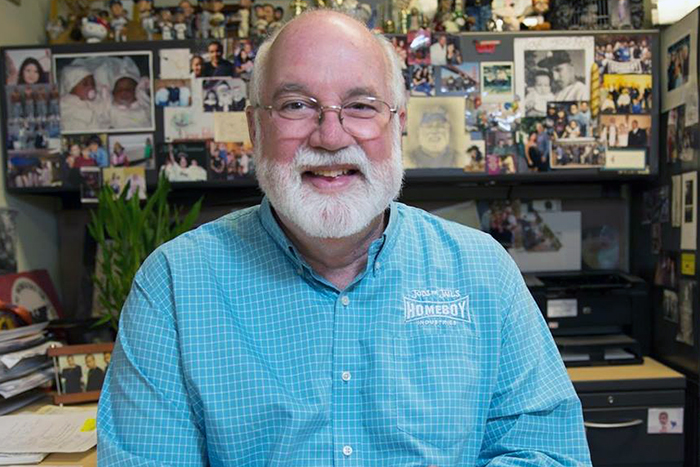
グレッグ・ボイル神父(自身のフェイスブックから)
ギャングから更正しようとする若者のための最大の職業訓練プログラム「ホームボーイ・インダストリーズ」の設立者、グレッグ・ボイル神父は、「バニエやラルシュの精神性に大きく影響された」と語る。特に、「最も成熟した信仰のあらわれは柔和さ」という理解を実践していることに感銘を受けたと言う。バニエの具体化されたメッセージは、人間の心の最も深い部分に語りかけ、大陸や文脈を超えて共鳴を呼んでいる。
[toggle]Father Greg Boyle, who founded Homeboy Industries, the largest job-training program for formerly gang-involved and previously incarcerated people, describes being deeply influenced by Vanier and the spirituality of L’Arche, in particular, living out the understanding that “tenderness is the highest form of spiritual maturity”. Vanier’s embodied message speaks to the deepest parts of the human heart and resonates across continents and contexts. [/toggle]国際的なミニストリーを率いる忠実なカトリック神学者として、晩年の彼は、「聖人と認定されることについてどう思うか」という質問を繰り返し受け、彼はいつもそれを否定した。彼が求めたのは、ただイエスの友人となること、愛と謙虚さのある人生を送ることであって、世界的な成功と称賛ではないからだ。彼はまた、「自分を聖人にしようとする人は、私のことをよく知らないのだ」と付け加えた。
[toggle]In the final years of his life, as a faithful Catholic theologian leading an international ministry, Vanier was repeatedly asked the question of what he would think of being made a saint. He always dismissed the idea. He explains that he really just wanted to be a friend of Jesus, someone who exemplifies a beautiful life of love and humility and not the pursuit of accolades and worldly success. He also said that anyone who would call for him to be a saint must not know him very well. [/toggle]「誰かを聖人にするとき、その人を台の上に置くことによって、『だから自分には同じようなことはできない』と言うのです」と彼はあるインタビューで答えている。「しかし、私たちは皆、共に働き、互いを愛するよう求められています。それに応えるのに、私たちが聖人である必要はありません」
[toggle] “As soon as you say people are saintly, you’re putting them on a pedestal and saying you can’t do it,” he said in one interview. “But we are all called to work together and love each other and we don’t have to be saints to do that.” [/toggle]バニエは自らの言葉と人生を通して、「私たちはみな同じようにもろく傷ついているが、私たちの美しさと他者とのつながりの源はまさにそこにある」と宣言した。私たちは聖者ではないかもしれないが、人間だ。つまり私たちには、イエスの友人となり、自らの心に従う条件は完全に備わっているのだ。
[toggle]Through his words and his life, Vanier proclaimed that we’re all the same, fragile and wounded, and that it is exactly there where we are beautiful and capable of connection to others. We may not be saints, but we are humans, and as it turns out, that perfectly equips us to be friends of Jesus and to follow the way of the heart. [/toggle]
ベタニー・マッキンニー・フォックス(自身のツイッターから)
執筆者のベタニー・マッキンニー・フォックス(博士、クリスチャン倫理、フラー神学校)は、愛されているみんなの教会(Beloved Everybody Church)の創立牧師。
本記事は「クリスチャニティー・トゥデイ」(米国)より翻訳、転載しました。翻訳にあたって、多少の省略をしています。
